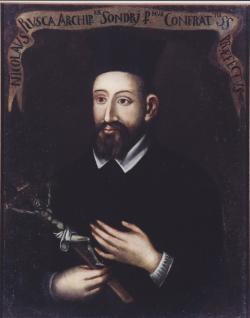Nicolò Rusca
Nicolò Rusca, born in Bedano (Ticino Canton) in 1563, was elected the archpriest of Sondrio in 1590, in very difficult times, both due to the clash between Catholics and followers of the Reformed Church – subsequent to the spreading of the Zwinglian and Calvinist reforms amongst the Grigioni to whom Valtellina, Chiavenna and Bormio were subjected -, and to the major decline of the traditional ecclesiastical institutions.
Rusca, who trained at Collegio Elvetico in Milan, under the wing of the great Carlo Borromeo, was a very learned priest who was greatly dedicated to his pastoral duties: he guided the Catholic community of Sondrio and of the entire Valtellina with great balance and moderation. This, however, did not stop him from becoming the innocent victim of the escalating clashes, especially within the Three Leagues, amongst the various political-religious factions. Arrested in the summer of 1618 and brought as a prisoner to Thusis, he was tried by a factious court, the expression of a particular political-religious group of a radical nature. Having rejected all of the unfounded accusations made against him, he was tortured and died on September 4th of the same year.
Rusca, who trained at Collegio Elvetico in Milan, under the wing of the great Carlo Borromeo, was a very learned priest who was greatly dedicated to his pastoral duties: he guided the Catholic community of Sondrio and of the entire Valtellina with great balance and moderation. This, however, did not stop him from becoming the innocent victim of the escalating clashes, especially within the Three Leagues, amongst the various political-religious factions. Arrested in the summer of 1618 and brought as a prisoner to Thusis, he was tried by a factious court, the expression of a particular political-religious group of a radical nature. Having rejected all of the unfounded accusations made against him, he was tortured and died on September 4th of the same year.




